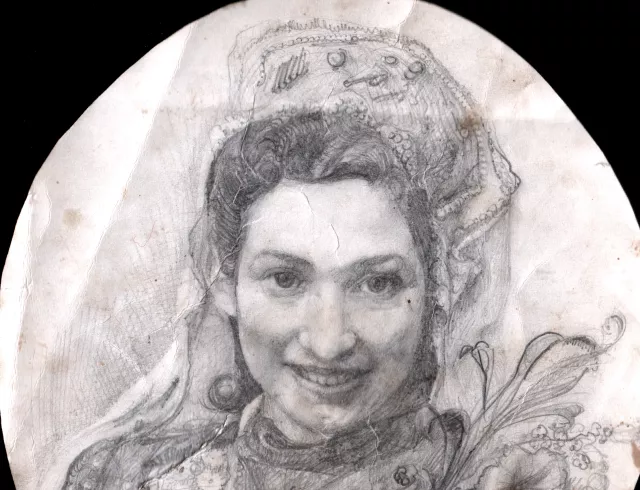This is a pencil portrait of my wife Sophia Zinger, nee Belinskaya, made by an inmate of a camp for prisoners of war in Voronezh in 1945.
I met my future wife when I was in the camp for prisoners-of-war in Voronezh in 1944. There was a house across the street from the building of the headquarters where we lived. I often saw a girl in a window. There was a big family living in that house. I often watched them through the window. It was an episode of peaceful life, associated with home. There was a river and a pump nearby where people came for water. We went to swim in the river and often saw this girl, who came with her buckets to get water. Once I took the courage to talk with her. I was wearing a German uniform that Germans had given me for my work. Those Germans didn't know that I was a Jew since I spoke fluent German. I also spoke Russian. I talked with the girl and asked if I could see her in the evening. I longed for talking with someone. I was afraid that she would refuse since she didn't know who I was. She agreed and we met in the evening. I chose a spot where nobody could see us since inmates of the camp weren't allowed to be outside in the evening. We walked and talked. It was like a holiday for me.
We began to see each other more often. I brought her food that we received in the camp. Her name was Sophia Belinskaya. I didn't know who she was. She looked like a gypsy girl. Once she told me that her mother told her to stop seeing me. She thought I was a German and might kill her. We talked more and she told me that she was a Jew. I confessed that I was a Jew, too. Her mother didn't believe it was true. She said there were only German inmates in the camp. I began to come to her home in the evening when nobody could see me.
Sophia lived in a big family. There were seven children and Sophia was the oldest. She was born in 1924. Sophia's mother was a housewife. Her father left their family. I tried to support their family as much as I could. Once Sophia's mother invited me to lunch. I understood that she wanted to talk to me and find out whether I could speak Yiddish. By the end of my visit she knew that I spoke better Yiddish than she did. After that Sophia's mother wasn't afraid of me any more and I visited them every evening.
In May 1945 we heard that the war was over. I hoped to be able to go home soon. I had no information about my family. Sophia and I decided to get married but postponed it until we came to my home. We wanted to celebrate our wedding with my family. I asked Ptashynskiy, the chief of the camp who was Jewish, to get some information about the situation in Subcarpathia. He sent a request about my family and received a response saying that no member of my family was alive.
I went to Uzhgorod. Some other people lived in the house of my sister Helena. I tried to have the house returned to me. The verdict of the court was positive and I got back the house. I went to Voronezh to take Sophia to our home. We returned to Uzhgorod where Sophia and I got married in 1946. We didn't have a Jewish wedding. We had a civil registration ceremony at the district registry office.
Sophia Zinger
The Centropa Collection at USHMM
The Centropa archive has been acquired by the United States Holocaust Memorial Museum in Washington, DC.
USHMM will soon offer a Special Collections page for Centropa.
Academics please note: USHMM can provide you with original language word-for-word transcripts and high resolution photographs. All publications should be credited: "From the Centropa Collection at the United States Memorial Museum in Washington, DC". Please contact collection [at] centropa.org.














